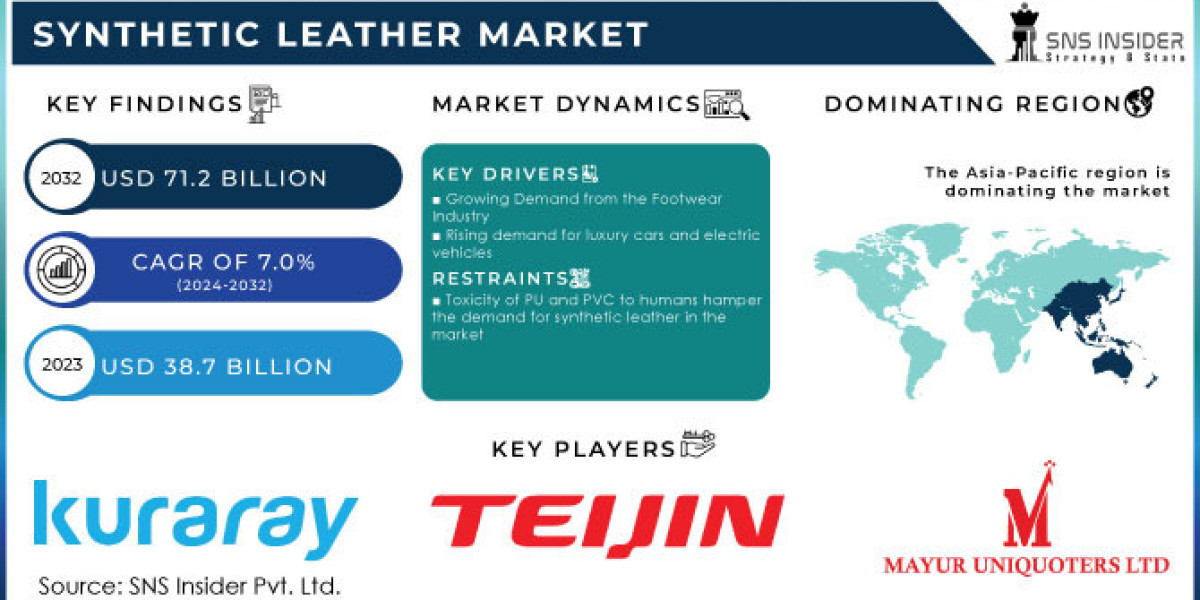The Synthetic Leather Market Size was valued at USD 38.7 billion in 2023, and is expected to reach USD 71.2 billion by 2032, and grow at a CAGR of 7.0% over the forecast period 2024-2032.
The Synthetic Leather Market is driven by increasing demand for eco-friendly, cost-effective, and durable alternatives to genuine leather. Synthetic leather, also known as artificial leather or faux leather, is widely used in industries such as automotive, fashion, footwear, upholstery, and accessories. Its benefits, including water resistance, ease of maintenance, and design versatility, have made it a preferred choice among manufacturers and consumers. The shift towards sustainable and cruelty-free materials has further fueled the market expansion.
Key Players in the Synthetic Leather Market
- Kuraray Co. Ltd., Teijin Limited, Mayur Uniquoters Limited, Filwel Co. Ltd., Alfatex N.V., Yantai Wanhua Synthetic Leather Group Co. Ltd., H.R. Polycoats Pvt. Ltd., NAN YA plastics corporation, San Fang Chemical Industry Co. Ltd., Zhejiang Hexin Industry Group Co. Ltd., and Others players.
Future Scope of the Market
The Synthetic Leather Market is expected to expand significantly due to:
- Increasing consumer preference for vegan and cruelty-free products.
- Rising demand in the automotive industry for premium yet sustainable interiors.
- Growth in the fashion industry as major brands shift toward eco-friendly alternatives.
- Advancements in bio-based and PU leather technologies enhancing durability and aesthetics.
- Stringent regulations against animal leather, prompting manufacturers to develop greener alternatives.
Emerging Trends in the Synthetic Leather Market
The market is evolving with innovations in bio-based synthetic leather, made from plant-based polymers and recycled materials, reducing environmental impact. Water-based and solvent-free polyurethane (PU) leather is gaining traction, addressing concerns over toxic emissions from traditional PVC-based leather. Additionally, smart synthetic leather, integrated with features like self-healing properties and enhanced breathability, is revolutionizing applications in automotive and luxury fashion. Sustainability remains a key driver, with manufacturers focusing on recyclability and biodegradability to meet regulatory standards and consumer expectations.
Key Points:
- Rising adoption of synthetic leather in automotive, fashion, and furniture industries.
- Shift toward bio-based, solvent-free, and water-based synthetic leather materials.
- Increasing demand for cruelty-free and sustainable alternatives to genuine leather.
- Technological advancements improving durability, texture, and performance.
- Stricter environmental regulations promoting eco-friendly synthetic leather production.
Conclusion
The Synthetic Leather Market is on a strong growth trajectory, driven by sustainability initiatives, technological advancements, and shifting consumer preferences. As industries continue to embrace vegan and eco-friendly materials, synthetic leather is set to become a dominant force in fashion, automotive, and interior applications, reinforcing its position as a sustainable alternative to traditional leather.
Read Full Report: https://www.snsinsider.com/reports/synthetic-leather-market-1475
Contact Us:
Jagney Dave — Vice President of Client Engagement
Phone: +1–315 636 4242 (US) | +44- 20 3290 5010 (UK)









